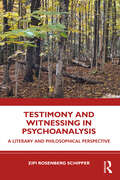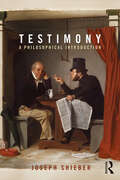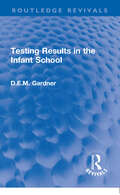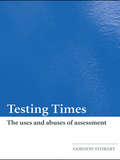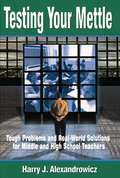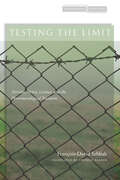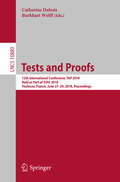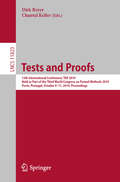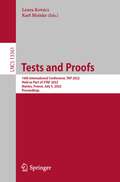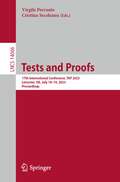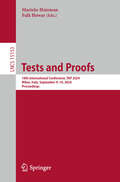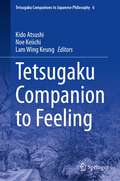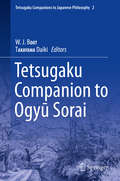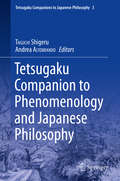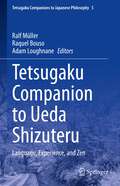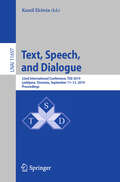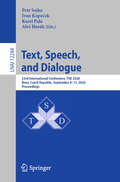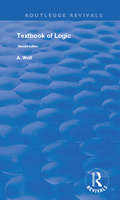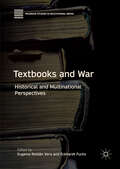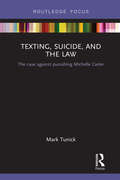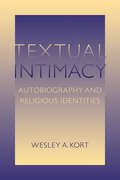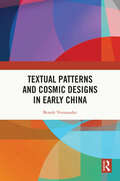- Table View
- List View
Testimony and Witnessing in Psychoanalysis: A Literary and Philosophical Perspective
by Zipi Rosenberg SchipperIn this fascinating volume, Zipi Rosenberg Schipper approaches the fundamental topic of testimony, seeking to recognize its value as a distinct and vital function in psychoanalytic work, separate from its inherited importance to work on trauma. Rosenberg Schipper introduces a revivifying philosophical, linguistic and psychoanalytic approach to the act of testimony, focusing on the role of witnessing in daily life and the importance it has as a therapeutic tool in psychoanalytic and psychological therapy. Throughout, she pinpoints three key psychoanalytic theories on patient testimony. She begins by looking at Freud’s foundational work on testimony as a means of concealing the unconscious and the questions of credibility in the consulting room this creates before looking at Winnicottian and Kohutian theories, whereby therapists take everything the patient says as a definitive truth. She concludes by looking at the Intersubjective and Relational schools of thought, where the therapist assumes the role of witness. By providing a comprehensive overview of the conflicting theories on the topic, Rosenberg Schipper equips practicing psychoanalysts and analysts-in-training with the tools necessary to utilize this vital therapeutic device and engage with it in treatment for all patients.
Testimony: A Philosophical Introduction
by Joseph ShieberThe epistemology of testimony has experienced a growth in interest over the last twenty-five years that has been matched by few, if any, other areas of philosophy. Testimony: A Philosophical Introduction provides an epistemology of testimony that surveys this rapidly growing research area while incorporating a discussion of relevant empirical work from social and developmental psychology, as well as from the interdisciplinary study of knowledge-creation in groups. The past decade has seen a number of scholarly monographs on the epistemology of testimony, but there is a dearth of books that survey the current field. This book fills that gap, assessing the strengths and weaknesses of all major competing theories. All chapters conclude with Suggestions for Further Reading and Discussion Questions.
Testing Results in the Infant School (Routledge Revivals)
by D.E.M. GardnerFirst published in 1942, Testing Results in the Infant School describes an attempt to measure objectively the results of education in Infant schools where children are free to move and speak and play, as compared with schools of a more formal and traditional type. The book explains in detail the variety of tests used, the reasons behind them, and the children’s reactions to them. It concludes with an evaluation of the results and suggestions for their bearing on educational practice. It will appeal to those with an interest in the history, theory, and psychology of education.
Testing Times: The Uses and Abuses of Assessment
by Gordon StobartAssessment dominates our lives but its good intentions often produce negative consequences. An example that is central to this book is how current forms of assessment encourage shallow ‘for-the-test’ learning. It is true to say that as the volume of assessment increases, confidence in what it represents is diminishing. This book seeks to reclaim assessment as a constructive activity which can encourage deeper learning. To do this the purpose, and fitness-for–purpose, of assessments have to be clear. Gordon Stobart critically examines five issues that currently have high-profile status: intelligence testing learning skills accountability the ‘diploma disease’ formative assessment Stobart explains that these form the basis for the argument that we must generate assessments which, in turn, encourage deep and lifelong learning. This book raises controversial questions about current uses of assessment and provides a framework for understanding them. It will be of great interest to teaching professionals involved in further study, and to academics and researchers in the field.
Testing Your Mettle: Tough Problems and Real-World Solutions for Middle and High School Teachers
by Harry J. AlexandrowiczIn this straightforward guide to what really happens in classrooms and hallways, veteran teacher and administrator Harry J. Alexandrowicz makes “reality training” available to both novice and experienced teachers. Alexandrowicz draws from his 28 years’ experience in schools to help prepare teachers to handle the inevitable legal, philosophical, and common-sense challenges they face every day. These challenges are presented as brief vignettes followed by four possible solutions with space for the educators to write their proposed actions, followed by sections on what actually happened, and why. The kinds of scenarios you will learn about include: A parent threatens you You witness students hazing another student You discover a gun in a student’s locker The school’s best athlete is failing your class You see inappropriate student behavior outside the classroom. This accessible “insider’s” view of the classroom will be an essential resource for teachers, administrators, and parents who want to gain valuable insights into how to handle what really happens in schools today.
Testing the Limit: Derrida, Henry, Levinas, and the Phenomenological Tradition
by Sebbah François-DavidIn exploring the nature of excess relative to a phenomenology of the limit,Testing the Limitclaims that phenomenology itself is an exploration of excess. What does it mean that "the self" is "given"? Should we see it as originary; or rather, in what way is the self engendered from textual practices that transgress-or hover around and therefore within-the threshold of phenomenologial discourse? This is the first book to include Michel Henry in a triangulation with Derrida and Levinas and the first to critique Levinas on the basis of his interpolation of philosophy and religion. Sebbah claims that the textual origins of phenomenology determine, in their temporal rhythms, the nature of the subjectivation on which they focus. He situates these considerations within the broader picture of the state of contemporary French phenomenology (chiefly the legacy of Merleau-Ponty), in order to show that these three thinkers share a certain "family resemblance," the identification of which reveals something about the traces of other phenomenological families. It is by testing the limit within the context of traditional phenomenological concerns about the appearance of subjectivity and ipseity that Derrida, Henry, and Levinas radically reconsider phenomenology and that French phenomenology assumes its present form.
Tests and Proofs: 12th International Conference, TAP 2018, Held as Part of STAF 2018, Toulouse, France, June 27-29, 2018, Proceedings (Lecture Notes in Computer Science #10889)
by Catherine Dubois Burkhart WolffThis book constitutes the refereed proceedings of the 12th International Conference on Tests and Proofs, TAP 2018, held as part of STAF 2018, in Toulouse, France, in June 2018. The 8 regular papers, 2 short papers, 1 invited paper and 1 invited tutorial presented in this volume were carefully reviewed and selected from 18 submissions. The TAP conference promotes research in verification and formal methods that targets the interplay of proofs and testing: the advancement of techniques of each kind and their combination, with the ultimate goal of improving software and system dependability.
Tests and Proofs: 13th International Conference, TAP 2019, Held as Part of the Third World Congress on Formal Methods 2019, Porto, Portugal, October 9–11, 2019, Proceedings (Lecture Notes in Computer Science #11823)
by Dirk Beyer Chantal KellerThis book constitutes the refereed proceedings of the 13th International Conference on Tests and Proofs, TAP 2019, held as part of the Third World Congress on Formal Methods 2019, Porto, Portugal, in October 2019. The 10 regular papers and 2 invited paper presented in this volume were carefully reviewed and selected from 19 submissions. The TAP conference promotes research in verification and formal methods that targets the interplay of proofs and testing: the advancement of techniques of each kind and their combination, with the ultimate goal of improving software and system dependability.
Tests and Proofs: 16th International Conference, TAP 2022, Held as Part of STAF 2022, Nantes, France, July 5, 2022, Proceedings (Lecture Notes in Computer Science #13361)
by Karl Meinke Laura KovácsThis book constitutes the proceedings of the 16th International Conference on Tests and Proofs, TAP 2022, which was held as part of Software Technologies: Applications and Foundations, STAF 2022, and took place in Nantes, France in July 2022.The 6 full papers together with 1 invited extended abstract included in this volume were carefully reviewed and selected from 11 submissions. They were organized in topical sections on formal analysis, and proofs, and effective testing.
Tests and Proofs: 17th International Conference, TAP 2023, Leicester, UK, July 18–19, 2023, Proceedings (Lecture Notes in Computer Science #14066)
by Cristina Seceleanu Virgile PrevostoThis book constitutes the proceedings of the 17th International Conference, TAP 2023, as part of STAF 2023, a federation of conferences on Software Technologies, Applications and Foundations, which includes two more conferences besides TAP: ICGT (International Conference on Graph Transformations), and ECMFA (European Conference on Modelling Foundations and Applications) in Leicester, UK, in July 2023. The 8 full papers together with 2 short papers included in this volume were carefully reviewed and selected from 14 submissions. They were organized in topical sections on Low-level Code Verification, Formal Models, Model-based test generation, and Abstraction and Refinement.
Tests and Proofs: 18th International Conference, TAP 2024, Milan, Italy, September 9–10, 2024, Proceedings (Lecture Notes in Computer Science #15153)
by Marieke Huisman Falk HowarThis book constitutes the proceedings of the 18th International Conference on Tests and Proofs, TAP 2024. TAP 2024 took place in Milan, Italy, on September 9 and 10, 2024 as part of the Formal Methods symposium (FM 2024), which included four more co-located conferences besides TAP: FMICS (Formal Methods in Industrial Critical Systems), LOPSTR (In ternational Symposium on Logic-based Program Synthesis and Transformation), PPDP (International Symposium on Principles and Practice of Declarative Pro gramming), and FACS (International Conference on Formal Aspects of Compo nent Software. The 7 full papers together with 1 short paper included in this volume were carefully reviewed and selected from 14 submissions. TAP’s scope encompasses many aspects of verification technology, including foundational work, tool development, and empirical research.
Tetsugaku Companion to Feeling (Tetsugaku Companions to Japanese Philosophy #6)
by Kido Atsushi Noe Keiichi Lam Wing KeungThis edited volume is the first in English that covers the philosophy of feeling and related topics in Japanese philosophy on Nishida Kitarō and fellow thinkers. Part I focuses on Nishida Kitarō’s philosophy of feeling, including, but not limited to, comparisons with Tanabe Hajime, Koyama Iwao, and provides coverage of Buddhist, moral and Chinese philosophy. Part II goes beyond Kitarō into topics such as Japanese aesthetics, Nietsche’s reception in Japan, and the philosophy of AI. This is a comprehensive scholarly text on feeling in Japanese philosophy, aimed at researchers and students working in the field.
Tetsugaku Companion to Japanese Ethics and Technology (Tetsugaku Companions to Japanese Philosophy #1)
by Thomas Taro Lennerfors Kiyoshi MurataThis book explores the relevance of Japanese ethics for the field of ethics of technology. It covers the theories of Japanese ethicists such as Nishida Kitarō, Watsuji Tetsurō, Imamichi Tomonobu, Yuasa Yasuo, as well as more contemporary ethicists, and explores their relevance for the analysis of energy technologies, ICT, robots, and geoengineering. It features contributions from Japanese scholars, and international scholars who have applied Japanese ethics to problems in the global condition. Technological development is considered to cause new ethical issues, such as genetically modified organisms fostering monocultures, nanotechnologies causing issues of privacy, as well as health and environmental issues, robotics raising issues about the meaning of humanity, and the risks of nuclear power, as witnessed in the Fukushima disaster. At the same time, technology embodies a hope for mankind, such as ICT improving relationships between human beings and nature, and smart systems assisting humans in leading a more ethical and environmentally friendly life. This book explores these ethical issues and their impact from a Japanese perspective.
Tetsugaku Companion to Nishida Kitarō (Tetsugaku Companions to Japanese Philosophy #4)
by Hisao Matsumaru Yoko Arisaka Lucy Christine SchultzThis book offers the first comprehensive collection of essays on the key concepts of Kitaro Nishida (1870-1945), the father of modern Japanese philosophy and founder of the Kyoto School. The essays analyze several of the major philosophical concepts in Nishida, including pure experience, absolute will, place, and acting intuition. They examine the meaning and positioning of Nishida’s philosophy in the history of philosophy, as well as in the contemporary world, and discuss the relevance of his philosophy in the present context. The book next looks at the significance of Nishida’s philosophy in the wider contexts of science, arts, and religion. The book includes a glossary of key terms that have been translated in a unified manner throughout the volume.
Tetsugaku Companion to Ogyu Sorai (Tetsugaku Companions to Japanese Philosophy #2)
by W. J. Boot Daiki TakayamaThis book contains short analyses (kaidai) of Ogyū Sorai’s (1666-1728) most important works, as well as a biography and a number of essays. The essays explore various aspects of his teachings, of the origins of his thought, and of the reception of his ideas in Japan, China, and Korea before and after "modernization" struck in the second half of the nineteenth century. Ogyū Sorai has come to be considered the pivotal thinker in the intellectual history of Early Modern Japan. More research has been done on Sorai than on any other Confucian thinker of this period. This book disentangles the modern reception from the way in which Sorai's ideas were understood and evaluated in Japan and China in the century following his death. The joint conclusion of the research of a number of the foremost specialists in Japan, Taiwan, and the West is that Sorai was and remains an original, innovative, and important thinker, but that his position within East-Asian thought should be redefined in terms of the East-Asian tradition to which he belonged, and not in the paradigms of European History of Philosophy or Intellectual History. The book represents up-to-date scholarship and allows both the young scholar to acquaint himself with Sorai, and the intellectual historian to compare Sorai with other thinkers of other times and of other philosophical traditions.
Tetsugaku Companion to Phenomenology and Japanese Philosophy (Tetsugaku Companions to Japanese Philosophy #3)
by Shigeru Taguchi Andrea AltobrandoThis volume addresses the impact of the introduction of phenomenology in Japan and its interaction with Japanese philosophy. It is well known that phenomenology was introduced at a very early stage in Japan. Furthermore, phenomenology still constitutes one of the main currents of thought in Japan. However, the specific way in which phenomenology has interacted with the indigenous Japanese tradition of thought and Japanese culture has until now not been addressed in great detail. This volume fills that gap. It discusses in detail the encounter and the interaction between Japanese thought and phenomenological reflection, with special regards to the topics of awareness and the self, the experience of otherness, ethics, and metaphysical issues. The book shows how phenomenology has served, and still serves, Japan to re-comprehend its “own” tradition and its specific form(s) of culture. At the same time, it offers an example of how different cultures and traditions can be both preserved and developed in their reciprocal action. More in general, it advances the philosophical debate beyond cultural enclosures and beyond mere scholasticism. The phenomenological tradition has always been open to new and alien ideas. An encounter with Japanese philosophy can offer a new challenge to actual phenomenological thinking.
Tetsugaku Companion to Ueda Shizuteru: Language, Experience, and Zen (Tetsugaku Companions to Japanese Philosophy #5)
by Ralf Müller Raquel Bouso Adam LoughnaneThis book presents the first collection of essays on the philosophy of Ueda Shizuteru in a Western language. Ueda, the last living member of the Kyoto school, has fostered the East-West dialogue in all his works and has helped to open up the Western image of philosophy by engaging the Zen tradition. The book reflects this particular trait of Ueda’s philosophy, but it also covers all thematic fields of his writings. Contributions from both young and established scholars and experts from Japan, Europe and the U.S. make this a unique introduction to and reception of Ueda’s philosophy. Readers will discover discussions of mysticism in the East and West, and consideration of modern philosophy topics including self-awareness, nature and poetic language. The book also presents a focussed look at language and nothingness, considering silence and nihilism. Chapters allow the reader to understand the timeliness of a thinking that mediates and transcends the dichotomy of East and West. This volume will appeal not only to scholars of Nishida, Japanese philosophy, mysticism and religious experience in Japan, but also to scholars of Western philosophy, especially those interested in Meister Eckhart, Martin Heidegger and Martin Buber. It makes an ideal introduction to Zen philosophy and presents important contributions to scholarship on language and experience.
Text, Speech, and Dialogue: 22nd International Conference, TSD 2019, Ljubljana, Slovenia, September 11–13, 2019, Proceedings (Lecture Notes in Computer Science #11697)
by Kamil EkšteinThis book constitutes the proceedings of the 22nd International Conference on Text, Speech, and Dialogue, TSD 2019, held in Ljubljana, Slovenia, in September 2019. The 33 full papers presented in this volume were carefully reviewed and selected from 73 submissions. They were organized in topical sections named text and speech. The book also contains one invited talk in full paper length.
Text, Speech, and Dialogue: 23rd International Conference, TSD 2020, Brno, Czech Republic, September 8–11, 2020, Proceedings (Lecture Notes in Computer Science #12284)
by Petr Sojka Aleš Horák Ivan Kopeček Karel PalaThis book constitutes the proceedings of the 23rd International Conference on Text, Speech, and Dialogue, TSD 2020, held in Brno, Czech Republic, in September 2020.*The 54 full papers presented in this volume were carefully reviewed and selected from 110 submissions. They were organized in topical sections named text, speech, and dialogue. The book also contains 3 invited talks.* The conference was held virtually due to the COVID-19 pandemic.
Textbook of Logic (Routledge Revivals)
by Wolf AbrahamOriginally published in 1930, this well-known text by the late British philosopher Abraham Wolf offers the student a practical, consistent, and comprehensive approach to logic which remains unique in its field. Dr. Wolf here deals systematically with the two main types of reasoning - formal logic and inductive logic - and their various applications. All the main elements of logic - such as inference, syllogism, dilemmas, evidence, deductive and inductive methods, and probability - are subsumed under these general headings. Professor Wolf strongly emphasizes the fact that logic cannot be mastered without some practical application; at the end of this volume, therefore, he includes a section of exercises based on each chapter. His unusally interesting appendix examines such matters as symbolic as logic, fallacies, the law of contradiction, modal propositions, the existential import of categorical propositions, predictables, and categories.
Textbooks and War: Historical and Multinational Perspectives (Palgrave Studies in Educational Media)
by Eckhardt Fuchs Eugenia Roldán VeraThis volume reflects on the role played by textbooks in the complex relationship between war and education from a historical and multinational perspective, asking how textbook content and production can play a part in these processes. It has long been established that history textbooks play a key role in shaping the next generation’s understanding of both past events and the concept of ‘friend’ and ‘foe’. Considering both current and historical textbooks, often through a bi-national comparative approach, the editors and contributors investigate various important aspects of the relationships between textbooks and war, including the role wars play in the creation of national identities (whether the country is on the winning or losing side), the effacement of international wars to highlight a country’s exceptionalism, or the obscuring of intra-national conflict through the ways in which a civil war is portrayed. This pioneering book will be of interest and value to students and scholars of textbooks, educational media and the relationships between curricula and war.
Texting, Suicide, and the Law: The case against punishing Michelle Carter
by Mark TunickIn 2014, Conrad Roy committed suicide following encouragement from his long-distance girlfriend, Michelle Carter, in what has become known as the Texting Suicide case. The case has attracted much attention, largely focusing on the First Amendment free speech issue. This book takes the view that the issue is intertwined with several others, some of which have received less attention but help explain why the case is so captivating and important, issues concerning privacy, accountability, coercion, punishment, and assisted suicide. The focus here is on how all of these issues are interconnected. By breaking the issue down into its complex layers, the work aids reasoned judgment, ensuring we aren’t guided solely by our gut reactions. The book is laid out as a case against punishing Ms. Carter, but it is less important that we agree with that conclusion than that we reach our conclusions not just through our instincts and intuitions but by thinking about these fundamental issues. The work will be of interest to scholars in law, political theory, and philosophy as an example of how theoretical issues apply to particular controversies. It will also appeal to readers interested in freedom of speech and the First Amendment, criminal justice and theories of punishment, suicide laws, and privacy.
Textual Intimacy: Autobiography and Religious Identities (Studies in Religion and Culture)
by Wesley A. KortGiven its affinity with questions of identity, autobiography offers a way into the interior space between author and reader, especially when writers define themselves in terms of religion. In his exploration of this "textual intimacy," Wesley Kort begins with a theorization of what it means to say who one is and how one's self-account as a religious person stands in relation to other forms of self-identification. He then provides a critical analysis of autobiographical texts by nine contemporary American writers—including Maya Angelou, Philip Roth, and Anne Lamott—who give religion a positive place in their accounts of who they are. Finally, in disclosing his own religious identity, Kort concludes with a meditation on several meanings of the word assumption.
Textual Narratives and a New Metaphysics (Routledge Revivals)
by Raymond T. ShorthouseThis title was first published in 2002: Drawing extensively upon recent developments in post-phenomenological philosophy, especially 'the textual turn' exemplified by Paul Ricoeur, Jacques Derrida and Maurice Merleau-Ponty, this book explores the role that textual narratives have in the possibility of reasonably affirming the intelligibility of the world. Shorthouse reveals how textual narratives can play a primary role in affirming rational meaning in a continuing hermeneutical process. Offering a radically new approach to metaphysics, Shorthouse demonstrates that rational meaning is ontologically grounded in terms of a transcendental viewpoint or perspective. It is this grounding which transcends the language and the self in a hermeneutical movement towards the affirmation of rational meaning. Revealing that the critical characteristic of reading a narrative is rhythm, Shorthouse explains how each narrative has a rhythmic structure, or prose rhythm, in relation to its semantic and figurative characteristics, activity and mood. Two key questions are explored: what kind of rational unity may be affirmed which does not close or suspend reflection? and what kind of linguistic mediation may generate an extralinguistic, or transcendental element in establishing an ontological grounding for this affirmation? The response to both these questions is presented in terms of textual sonority, where Shorthouse draws upon, and develops, Maurice Merleau-Ponty's notion of sonorous being.
Textual Patterns and Cosmic Designs in Early China
by Benoît VermanderVia a hermeneutics focused on Chinese numerology and concentric arrangements, this book offers a novel construal of the textual universe proper to early China writings.The author lays bare distinguishable patterns of textual composition while relating them to corresponding patterns of thinking. He differentiates rhetorical variants through detailed studies of the Zhuangzi’s Inner chapters, the Laozi, the Analects, and the Huainanzi. The philosophical depth and relevance of the Chinese ancient worldview appear in a fresh light when one unearths the patterns into which its content is embedded. The focus on textual patterns and rhetorical arrangements also facilitates the reading of Chinese classics alongside other traditions.The book will be a valuable reference for scholars and graduate students studying Chinese literary criticism, Chinese philosophy, and comparative philosophy.
